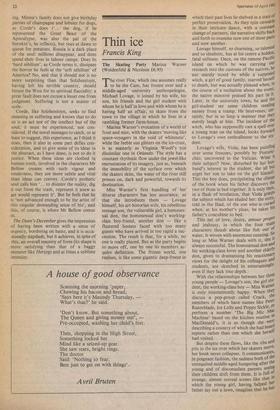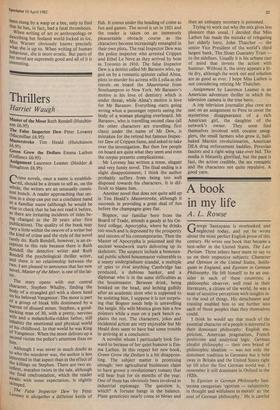Thin ice
Francis King
The Skating Party Marina Warner (Weidenfeld & Nicolson £6.95) rr he river Floe, which one assumes really 1. to be the Cam, has frozen over and a middle-aged university anthropologist, Michael Lovage, is joined by his wife, his son, his friends and the girl student with whom he is half in love and with whom he is having half an affair, to skate from the town to the village in which he lives in a rambling former farm-house.
Marina Warner's evocation of a world of frost and mist, with the skaters 'moving like space-voyagers in the void of whiteness', while the feeble sun glitters on the ice-crust, is as masterly as Virginia Woolf's not dissimilar one in Orlando. The style has a constant rhythmic flow under the jewel-like encrustation of its imagery, just as, beneath the immobility of the surface over which the skaters skim, the water of the river still presses on, dark and powerful, towards its destination.
Miss Warner's first handling of her diverse characters has less assurance, so that she introduces them — Lovage himself, his art-historian wife, his rebellious teenage son, the vulnerable girl, a homosex- ual don, the homosexual don's working- class boy-friend, another don — like a flustered hostess faced with too many guests who have arrived in too rapid a suc- cession. The result is that, for a while, no one is really placed. But as the party begins to move off, one by one its members ac- quire definition. The frozen world, one realises, is like some gigantic deep-freeze in perfect preservation. As they spin onwards in their intricate dance, with a constant change of partners, the narrative shifts back and forth to examine now one of these Pasts and now another.
Lovage himself, so charming, so talented and so idealistic, has at his centre a hidden, fatal softness. Once, on the remote Pacific island on which he was carrying out research into the customs of the natives, he not merely stood by while a supposed witch, a girl of good family, starved herself to death, but was actually pleased when, in the course of a recitation about the event, the native minstrel praised his part in it. Later, in the university town, he and the girl-student see some children stealing money from a tramp. He intervenes, cer- tainly, but in so limp a manner that they merely laugh at him. The incident of the witch, who has supposedly cast a spell over a young man on the island, looks forward to Lovage's own enthrallment to the stu- dent.
Lovage's wife, Viola, has been puzzling over some frescoes, possibly by Pinturic- chio, uncovered in the Vatican. What is their subject? Now, disturbed by her hus- band's interest in the student, she all but urges her son to take on the girl himself. This the boy does, precipitating the climax of the book when his father discovers the two of them in bed together. It is only then, in a flash of revelation, that Viola grasPs the subject which has eluded her: the storY, told in the Iliad, of the son who is cursed when, at his mother's pleas, he takes his father's concubine to bed.
This net of love, desire, amour propre and jealousy, in which the four main characters thrash about like fish out of water, is woven with enormous cunning. 5° long as Miss Warner deals with it, she is always successful. The homosexual don and his working-class lover and another elderly don, given to dramatising his reactionary views for the delight of his colleagues and students, are sketched in entertainingly' even if they lack true depth. With the relationships between her three young people — Lovage's son, the girl stu- dent, the working-class boy — Miss Warner is only intermittently happy. When they discuss a pop-group called Crack, the members of which have names like Peter Razorblade, Ice Lolly and Poppy Sickle, or perform a number 'The Big Mic Mac Machine' based on the kitchen routine in MacDonald's, it is as though she were, describing a country of which she had heard reports rather than one which she herself had visited. But despite these flaws, like the ribs and pits in the ice over which her skaters move, her book never collapses. It communicates, in poignant fashion, the sadness both of the unrequited middle-aged hungering after the young and of disconsolate parents seeing their children drift from them. It is full of strange, almost surreal scenes like that in which the young girl, having helped her father lay out a lawn, imagines that he has
been stung by a wasp or a bee, only to find that he has, in fact, had a fatal thrombosis.
When writing of art or anthropology or describing her fenland world locked in ice, Miss Warner obviously knows precisely what she is up to. When writing of human behaviour, she is more erratic. But parts of her novel are supremely good and all of it is interesting.



































 Previous page
Previous page